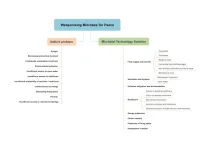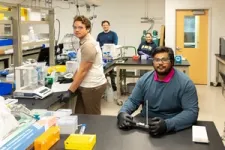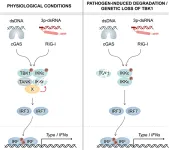(Press-News.org) Microorganisms should be ‘weaponised’ to stave off conflicts across the globe, according to a team of eminent microbiologists.
The paper ‘Weaponising microbes for peace’ by Anand et al, outlines the ways in which microbes and microbial technologies can be used to tackle global and local challenges that could otherwise lead to conflict, but warns that these resources have been severely underexploited to date.
Professor Kenneth Timmis, Founding Editor of AMI journals Environmental Microbiology, Environmental Microbiology Reports and Microbial Biotechnology, says that worldwide deficits and asymmetries in basic resources and services considered to be human rights, such as drinking water, sanitation, healthy nutrition, access to basic healthcare and a clean environment, can lead to competition between peoples for limited resources, tensions, and in some cases conflicts.
“There is an urgent need to reduce such deficits, to level up, and to assure provision of basic resources for all peoples. This will also remove some of the causes of conflicts. There is a wide range of powerful microbial technologies that can provide or contribute to this provision of such resources and services, but deployment of such technologies is seriously underexploited,” Professor Timmis said.
The paper then lists a series of ways in which microbial technologies can contribute to challenges such as food supply and security, sanitation and hygiene, healthcare, pollution, energy and heating, and mass migrations and overcrowding. For example, microbes are at the core of efforts to tackle pollution by bioremediation, replacing chemical methods of treating drinking water with metalloid conversion systems, and producing biofuels from wastes.
“There is now a desperate need for a determined effort by all relevant actors to widely deploy appropriate microbial technologies to reduce key deficits and asymmetries, particularly among the most vulnerable populations,” Professor Timmis said..
“Not only will this contribute to the improvement of humanitarian conditions and levelling up, and thereby to a reduction in tensions that may lead to conflicts, but also advance progress towards attainment of Sustainable Development Goals,” he said. .
“In this paper, we draw attention to the wide range of powerful microbial technologies that can be deployed for this purpose and how sustainability can be addressed at the same time. We must weaponise microbes for peace.”
The editorial is published in Microbial Biotechnology, an Applied Microbiology International publication, on March 7 2023.
RECOMMENDED ACTIONS TO IMPLEMENT RELEVANT MICROBIAL TECHNOLOGY SOLUTIONS TO DEFICITS
We need to urgently supply to communities lacking adequate levels of basic resources/services the infrastructure and know-how (capacity building), and funding for
use of agrobiologics to increase crop yields, by providing green nitrogen, stimulating plant growth, and combatting pathogens and pests,
exploitation of plant:microbe partnerships to improve soil health and implement regenerative agriculture,
creation of nutritious fermented food from locally available crops,
better use of microbes in the feed and food supply chains,
production of microbial food for humans and farm animals,
drinking water production and quality safeguarding,
waste treatment with resource recovery,
creation of modular DIY digital medical centres,
production of vaccines and medicines,
bioremediation and biorestoration of the environment in general and natural ecosystems in particular, to create healthier habitats and promote biodiversity
reduction of greenhouse gas production and capturing carbon,
production of biofuels,
creation of local employment opportunities associated with the above,
development of transdisciplinary approaches, using chemistry-related, computation technologies, psychology-related and other approaches that are synergistic to microbial solutions and
education in societally relevant microbiology
‘Weaponising microbes for peace’ is published in Microbial Biotechnology, an Applied Microbiology International publication, on March 7 2023.
The authors are Shailly Anand, John E. Hallsworth, James Timmis, Willy Verstraete, Arturo Casadevall, Juan Luis Ramos, Utkarsh Sood, Roshan Kumar, Princy Hira, Charu Dogra Rawat, Abhilash Kumar, Sukanya Lal, Rup Lal, Kenneth Timmis.
To read the full paper, click HERE.
To find out more about AMI, visit https://appliedmicrobiology.org/ or https://www.the-microbiologist.com/.
To interview Professor Kenneth Timmis, email kntimmis@googlemail.com.
END
Microbes can create a more peaceful world: Scientists call to action
Microorganisms should be ‘weaponized’ to stave off conflicts across the globe, according to a team of eminent microbiologists
2023-03-10
ELSE PRESS RELEASES FROM THIS DATE:
University of Freiburg establishes Eva Mayr-Stihl Chair for Multi-Scale Characterization of Materials Systems
2023-03-10
New analytical methods and approaches to research are enhancing sustainability and materials research with particular reference to engineering science/technology at the University of Freiburg: Dr. Oana Cojocaru-Mirédin is taking on the new Eva Mayr-Stihl Chair for Multi-Scale Characterization of Materials Systems which has been established at the University’s Department of Sustainable Systems Engineering (INATECH).
Cojocaru-Mirédin, who previously researched and taught at RWTH Aachen, specializes in the application of various characterization techniques in the study of materials ...
Immune cells have a backup mechanism
2023-03-10
The enzyme TBK1 is an important component of the innate immune system that plays a critical role in the defense against viruses. Upon mutation-induced loss of TBK1 function, patients show an increased susceptibility to viral infections. Strikingly, if TBK1 is not expressed at all, this clinical effect is not seen. The mechanism behind this supposed discrepancy has now been elucidated by researchers led by Prof. Martin Schlee from the University Hospital Bonn and the Cluster of Excellence ImmunoSensation2 at the University of Bonn. The study was published in the journal Frontiers in Immunology.
In the human body, viral particles are ...
Researchers discover therapeutic target to aid in glaucoma treatment
2023-03-10
INDIANAPOLIS—Indiana University School of Medicine researchers have identified a new therapeutic target that could lead to more effective treatment of glaucoma.
Glaucoma is a neurodegenerative disease that causes vision loss and blindness due to a damaged optic nerve. More than 200,000 people are affected by glaucoma in the United States each year. Unfortunately, there is currently no treatment. In a newly published paper in Communications Biology, researchers found neurons use mitochondria for a steady source of energy, and restoring mitochondrial homeostasis in the diseased neurons can protect the optic nerve cells from being damaged.
“Age-related ...
Medicaid expansion reduced black-white disparities in preventable hospital visits
2023-03-10
Expanding Medicaid-benefit eligibility to cover all people with income below 139 percent of the federal poverty line reduced Black-white disparities in preventable hospitalizations and emergency department (ED) visits, according to research from Rutgers University and the U.S. Agency for Healthcare Research and Quality.
The analysis of state-level inpatient and ED data from 2011 to 2018 showed that such disparities fell 10 percent or more in states that expanded eligibility compared to states that continued with older, stricter requirements.
Benefit expansion didn’t affect the relatively smaller disparities in preventable hospitalizations and ED visits between ...
New study challenges our understanding of the immune system
2023-03-10
A recently published study from Aarhus University may mean a textbook chapter on the immune system will have to be rewritten.
In the study, published in the journal Nature Communications, the researchers reveal crucial new knowledge about B cells, which form a vital element in the body’s defence system. B cells are the cells that generate protective antibodies when we are vaccinated or have an infection – and it is also the B cells that produce harmful antibodies in connection with allergies or autoimmune diseases.
The researchers have examined the earliest step ...
University of Cincinnati researchers develop innovative breathing aid
2023-03-10
One in 10 adults suffer from the debilitating effects of chronic obstructive pulmonary disease (COPD). Research around a new breathing device developed by pulmonologists at the University of Cincinnati offers promise for improving their lives.
The new device not only improves symptoms of breathlessness and quality of life for people with COPD, it also offers benefits for people dealing with stress and anxiety and those practicing mindfulness, meditation or yoga.
The research was published in the journal Respiratory Care.
The device, called PEP Buddy, was created by Muhammad Ahsan Zafar, MD, and Ralph Panos, MD. Zafar is an associate professor in the Department of Pulmonary Critical ...
Insurance status and race, ethnicity inequities in the diagnosis of advanced cervical cancer
2023-03-10
About The Study: The findings of this study of nearly 24,000 individuals suggest that insurance is a modifiable risk factor that plays an important role in the racial and ethnic inequities observed in the diagnosis of advanced-stage cervical cancer. Expanding access to care and improving the quality of services rendered for uninsured patients and those covered by Medicaid may mitigate the known inequities in cervical cancer diagnosis and related outcomes.
Authors: Hunter K. Holt, M.D., M.A.S., of the University of Illinois at Chicago, is the corresponding author.
To access the embargoed study: Visit our For The Media ...
Association of primary care visit length with potentially inappropriate prescribing
2023-03-10
About The Study: In this study of 4.3 million patients, those who were younger, publicly insured, Hispanic, or non-Hispanic Black had shorter primary care physician visits. Shorter visits were associated with a higher likelihood of inappropriate antibiotic prescribing for patients with upper respiratory tract infections and co-prescribing of opioids and benzodiazepines for patients with painful conditions. These findings suggest opportunities for additional research and operational improvements to visit scheduling and quality of prescribing decisions ...
Neutrons reveal how the spider lily preys on cancer, preserves healthy cells
2023-03-10
A scientific instrument at the Department of Energy’s Oak Ridge National Laboratory could help create a noninvasive cancer treatment derived from a common tropical plant.
Pancratistatin is a chemical compound found in the spider lily, a native Hawaiian flower. Unlike traditional treatments, it kills cancer cells while keeping healthy cells intact.
Until recently, pancratistatin’s workings have mystified scientists, clouding hope for potential new treatments. But after conducting neutron experiments at ORNL, students from the University of Windsor have ...
Migratory birds take breaks to boost their immune system
2023-03-10
Exercising too much and not getting enough rest is bad for your health. A new study from Lund University in Sweden shows that the same is true for migratory birds. They need to rest not only to renew their energy levels but also in order to boost their immune system.
After a period of physical exertion, vertebrates, including humans, usually need a period of recovery. Apart from the obvious – lowering the heart rate and repairing injured muscles – other, less prominent physiological systems might also need to recover. Intensive physical activity can affect an individual’s basic immune defence.
When birds migrate, they regularly stop in one place for a ...
LAST 30 PRESS RELEASES:
COVID-19 vaccination during pregnancy may help prevent preeclampsia
Menopausal hormone therapy not linked to increased risk of death
Chronic shortage of family doctors in England, reveals BMJ analysis
Booster jabs reduce the risks of COVID-19 deaths, study finds
Screening increases survival rate for stage IV breast cancer by 60%
ACC announces inaugural fellow for the Thad and Gerry Waites Rural Cardiovascular Research Fellowship
University of Oklahoma researchers develop durable hybrid materials for faster radiation detection
Medicaid disenrollment spikes at age 19, study finds
Turning agricultural waste into advanced materials: Review highlights how torrefaction could power a sustainable carbon future
New study warns emerging pollutants in livestock and aquaculture waste may threaten ecosystems and public health
Integrated rice–aquatic farming systems may hold the key to smarter nitrogen use and lower agricultural emissions
Hope for global banana farming in genetic discovery
Mirror image pheromones help beetles swipe right
Prenatal lead exposure related to worse cognitive function in adults
Research alert: Understanding substance use across the full spectrum of sexual identity
Pekingese, Shih Tzu and Staffordshire Bull Terrier among twelve dog breeds at risk of serious breathing condition
Selected dog breeds with most breathing trouble identified in new study
Interplay of class and gender may influence social judgments differently between cultures
Pollen counts can be predicted by machine learning models using meteorological data with more than 80% accuracy even a week ahead, for both grass and birch tree pollen, which could be key in effective
Rewriting our understanding of early hominin dispersal to Eurasia
Rising simultaneous wildfire risk compromises international firefighting efforts
Honey bee "dance floors" can be accurately located with a new method, mapping where in the hive forager bees perform waggle dances to signal the location of pollen and nectar for their nestmates
Exercise and nutritional drinks can reduce the need for care in dementia
Michelson Medical Research Foundation awards $750,000 to rising immunology leaders
SfN announces Early Career Policy Ambassadors Class of 2026
Spiritual practices strongly associated with reduced risk for hazardous alcohol and drug use
Novel vaccine protects against C. diff disease and recurrence
An “electrical” circadian clock balances growth between shoots and roots
Largest study of rare skin cancer in Mexican patients shows its more complex than previously thought
Colonists dredged away Sydney’s natural oyster reefs. Now science knows how best to restore them.
[Press-News.org] Microbes can create a more peaceful world: Scientists call to actionMicroorganisms should be ‘weaponized’ to stave off conflicts across the globe, according to a team of eminent microbiologists





